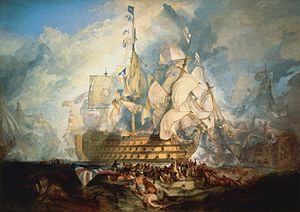Anglo-Spanish War (1796–1808) facts for kids
The Anglo-Spanish War was a series of conflicts between Great Britain and Spain. It happened in two main parts: first from 1796 to 1802, and then again from 1804 to 1808. These wars were part of bigger conflicts called the Coalition Wars. The fighting stopped when Britain and Spain became allies. This happened because France had invaded Spain.
Quick facts for kids Anglo-Spanish War |
|||||||||
|---|---|---|---|---|---|---|---|---|---|
| Part of the Anglo-Spanish Wars and the Coalition Wars | |||||||||
 The Battle of Trafalgar by J. M. W. Turner (oil on canvas, 1822–24) |
|||||||||
|
|||||||||
| Belligerents | |||||||||
|
1796–1802: 1804–1808: |
1796–1801: 1801–1802, 1804–1808: Supported by: |
||||||||
| Commanders and leaders | |||||||||
| Strength | |||||||||
|
|
||||||||
Contents
Why Did the War Start?
Before this war, Spain was fighting against France. This was part of the War of the First Coalition. Spain wanted to help bring back the old royal family in France. But France won many battles. Spain also faced tough times.
By 1795, Spain signed a peace treaty with France. This meant Spain left the fight against France. Then, in 1796, Spain's leader, Manuel Godoy, made a deal with France. This deal was called the Second Treaty of San Ildefonso. Spain and France agreed to become allies and fight against Great Britain. Spain hoped to gain land and money from this new alliance. Britain was a big naval threat to Spain at the time.
Key Events of the War
First Part: 1796–1802
This part of the war was hard on Spain. Britain's navy blocked Spanish ports. This made it difficult for Spain to get money and goods from its colonies.
Spain had a large fleet of 27 warships. They planned to join with the French fleet. Their goal was to protect valuable goods coming from the colonies. Britain's fleet in the Mediterranean Sea was smaller. It had only 15 warships. This forced the British to leave Corsica and Elba by 1797.
However, the Spanish navy struggled to work with their French allies. They suffered a big loss at the Battle of Cape St. Vincent. This made Spain weaker at sea for the rest of the war. Even so, Spain successfully defended against two British attacks on Cádiz and Tenerife. They also stopped a British plan to attack Ferrol.
The war also reached the Pacific Ocean. In 1797, Spanish ships captured some British merchant and whaling ships there.
Second Part: 1804–1808
A peace treaty called the Treaty of Amiens was signed in 1802. This brought a short break in the fighting. But the peace ended in 1804. British ships attacked a Spanish group of ships carrying gold and silver. This happened without a declaration of war. One Spanish ship, the Nuestra Señora de las Mercedes, exploded. The British captured the other ships.
France then planned to invade Britain. The Spanish fleet was meant to help with this invasion. But in 1805, the combined French and Spanish fleets were attacked by the British. This was the famous Battle of Trafalgar. The British won a major victory. This win stopped Napoleon's plan to invade Britain. It also made the Spanish government, led by Godoy, question their alliance with Napoleon.
Meanwhile, Britain tried to take over the Río de la Plata region in South America. This was an important area for Spain. But the British attacks in 1806 and 1807 failed.
Godoy later tried to pull Spain away from Napoleon's plan to block trade with Britain. But he rejoined it in 1807. By this time, Napoleon no longer trusted Godoy or the Spanish King Charles IV. Many people in Spain also supported the king's son, Ferdinand. Ferdinand was against Godoy and wanted to be allies with Britain.
What Happened After the War?
In 1807, France and Spain invaded Portugal. They captured Lisbon without a fight on December 1st. By early 1808, France had a very strong presence in Spain. This led to a revolt by the Spanish people.
Napoleon then removed King Charles and his son Ferdinand from power. He forced them to give up the throne on May 5th. Napoleon then made his brother, Joseph, the new king of Spain. This event started the Peninsular War. It also marked the end of the Anglo-Spanish War.
George Canning, who was Britain's foreign minister, made an important statement. He said that Britain would no longer remember the war with Spain. He declared that any country fighting against France would become a natural ally of Great Britain.
Because of this, the Spanish government and other groups fighting for Spain became allies with Britain. This alliance continued as the Peninsular War unfolded.
See also
 In Spanish: Guerra anglo-española (1796-1802) para niños
In Spanish: Guerra anglo-española (1796-1802) para niños
 | Ernest Everett Just |
 | Mary Jackson |
 | Emmett Chappelle |
 | Marie Maynard Daly |

